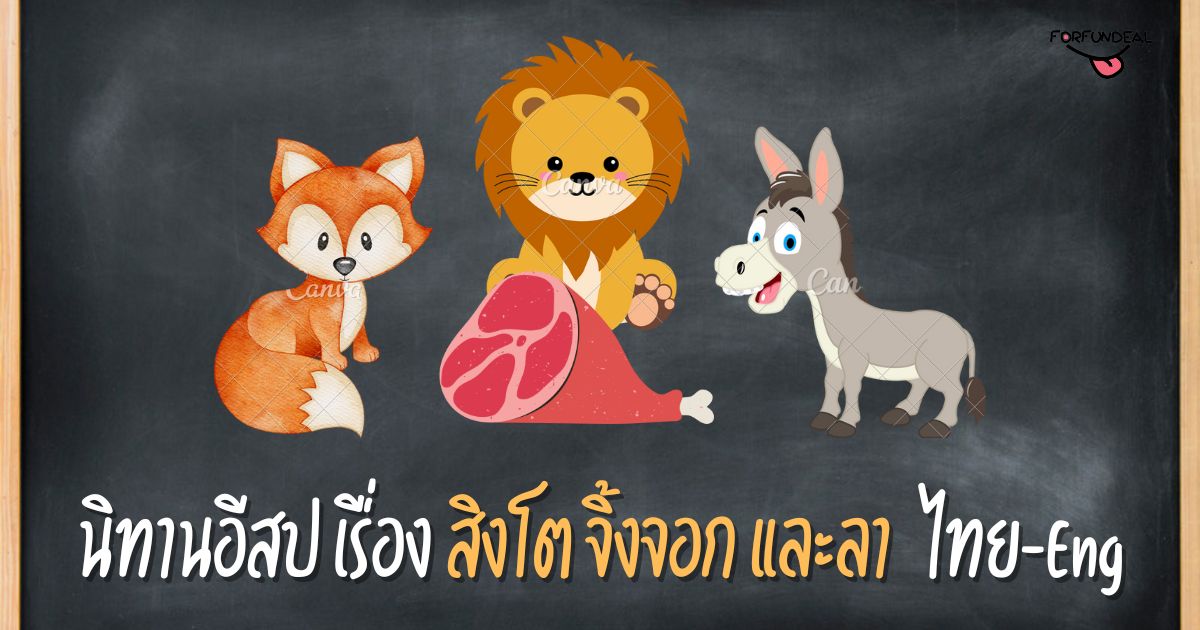“สิงโต จิ้งจอก และลา” เป็นนิทานอีสปที่สอนให้เรารู้ถึงความไม่เท่ากันในสังคม ซึ่งมันเป็นสิ่งที่เราทุกคนต้องประสบพบเจอ ความไม่ยุติธรรม การเอารัดเอาเปรียบ
นิทานอีสปเรื่องสิงโต จิ้งจอก และลา
กาลครั้งหนึ่งนานมาแล้ว สิงโต สุนัขจิ้งจอก และลาได้รวมตัวกันเป็นพันธมิตรที่ไม่น่าจะเป็นไปได้ และตัดสินใจที่จะออกล่าสัตว์ด้วยกัน พวกมันตกลงที่จะแบ่งปันของที่ปล้นมาจากการล่าของพวกมันอย่างเท่าเทียมกัน เมื่อพวกมันเข้าไปในป่า พวกมันจับกวางได้สำเร็จและฉลองชัยชนะของพวกมัน
Once upon a time, a lion, a fox, and an ass formed an unlikely alliance and decided to go hunting together. They agreed to share the spoils of their hunt equally among themselves. As they ventured into the forest, they successfully caught a deer and celebrated their triumph.
อย่างไรก็ตาม เมื่อถึงเวลาต้องแบ่งเนื้อกวาง สิงโตซึ่งแข็งแกร่งที่สุดและมีอำนาจเหนือที่สุดก็อ้างสิทธิ์ในส่วนแบ่งที่ใหญ่ที่สุดสำหรับตัวมันเอง สุนัขจิ้งจอกเจ้าเล่ห์และมีไหวพริบ สามารถรักษาส่วนที่ปานกลางไว้สำหรับตัวมันเอง น่าเสียดายที่ลาผู้น่าสงสารซึ่งอ่อนแอที่สุด และไร้เดียงสาที่สุดกลับถูกทิ้งให้เหลือส่วนที่เล็กที่สุด และน่าปรารถนาน้อยที่สุด
However, when it came time to divide the spoils, the lion, being the strongest and most dominant, claimed the largest share for himself. The fox, cunning and quick-witted, managed to secure a moderate portion for himself. Unfortunately, the poor ass, being the weakest and most naive, was left with the smallest and least desirable portion.
เมื่อรู้สึกว่าถูกปฏิบัติอย่างไม่ยุติธรรม ลาจึงบ่นกับสิงโตแสดงความไม่พอใจต่อการแบ่งที่ไม่เท่าเทียมกัน สิงโตมองลาด้วยความรังเกียจและตอบว่า “เงียบ เจ้าสัตว์โง่เขลา! อย่าสงสัยระเบียบธรรมชาติ มันเป็นสิทธิ์ของข้าในฐานะราชาแห่งป่าที่จะอ้างสิทธิ์ในส่วนแบ่งของข้า”
Feeling unjustly treated, the ass complained to the lion, expressing his dissatisfaction with the unequal division. The lion, looking down at the ass with disdain, replied, “Silence, foolish creature! Do not question the natural order. It is my right as the king of the forest to claim the lion’s share.”

นิทานเรื่องนี้สอนให้รู้ว่า
“ในกลุ่มพันธมิตรและหุ้นส่วน ความเป็นธรรมและความเสมอภาคถือเป็นสิ่งสำคัญสำหรับความสำเร็จและความสามัคคี ฝ่ายที่เข้มแข็งกว่าควรหลีกเลี่ยงการเอารัดเอาเปรียบผู้ที่อ่อนแอกว่า”
- ความไม่เท่าเทียมกันและการแสวงหาผลประโยชน์ เรื่องราวเน้นให้เห็นถึงความไม่เท่าเทียมกันและการแสวงหาผลประโยชน์ภายในพลวัตของอำนาจ ความโดดเด่นของสิงโตช่วยให้มันได้ส่วนที่ใหญ่ที่สุดสำหรับตัวมันเอง โดยปล่อยให้สิงโตที่อ่อนแอกว่าเหลือน้อยลง ทำหน้าที่เป็นเครื่องเตือนใจถึงการกระจายทรัพยากรที่ไม่เป็นธรรมซึ่งอาจเกิดขึ้นได้ในระบบหรือความสัมพันธ์บางอย่าง
- พละกำลังและไหวพริบ พละกำลังของสิงโตและความฉลาดแกมโกงของสุนัขจิ้งจอกมีบทบาทสำคัญในความสามารถในการรักษาส่วนแบ่งที่มากขึ้น เรื่องนี้ชี้ให้เห็นว่าผู้ที่มีอำนาจและสติปัญญามักจะได้เปรียบในการกำหนดผลลัพธ์ของสถานการณ์
- ความสำคัญของการยืนหยัดต่อสู้กับความอยุติธรรม การร้องเรียนของลาแสดงให้เห็นถึงความสำคัญของการต่อต้านการปฏิบัติที่ไม่เป็นธรรม แม้จะอ่อนแอที่สุด แต่ลาก็กล้าที่จะแสดงความไม่พอใจออกมา เรื่องนี้สอนเราถึงคุณค่าของการเรียกร้องความเป็นธรรมและการตั้งคำถามถึงการปฏิบัติที่ไม่ยุติธรรม
- ตระหนักถึงตำแหน่งและอำนาจของตน การตอบสนองของสิงโตต่อลาสะท้อนให้เห็นถึงการไม่สนใจความรู้สึกและสิทธิของผู้อื่น ทำหน้าที่เป็นเครื่องเตือนใจให้ผู้ดำรงตำแหน่งที่มีอำนาจพิจารณาความรับผิดชอบและปฏิบัติต่อผู้อื่นด้วยความยุติธรรมและความเคารพ
“In alliances and partnerships, fairness and equity are essential for their success and harmony. Stronger parties should avoid exploiting the weaker.”
- Inequality and exploitation: The story highlights the presence of inequality and exploitation within power dynamics. The lion’s dominance allows him to claim the largest portion for himself, leaving the weaker members with less. It serves as a reminder of the unjust distribution of resources that can occur in certain systems or relationships.
- Strength and cunning: The lion’s strength and the fox’s cunning play significant roles in their ability to secure a larger share. The story suggests that those with power and intelligence often have an advantage in determining the outcome of situations.
- Importance of standing up against injustice: The ass’s complaint demonstrates the importance of speaking up against unfair treatment. Despite being the weakest, the ass had the courage to voice his dissatisfaction. This teaches us the value of advocating for fairness and questioning unjust practices.
- Recognizing one’s position and power: The lion’s response to the ass reflects a disregard for the feelings and rights of others. It serves as a reminder to those in positions of power to consider their responsibilities and treat others with fairness and respect.
โดยสรุปแล้วนิทานเรื่องนี้สอนเราเกี่ยวกับความไม่เท่าเทียม การเอารัดเอาเปรียบ การยืนหยัดต่อสู้กับความอยุติธรรม และความรับผิดชอบของผู้มีอำนาจ โดยการใคร่ครวญคำสอนเหล่านี้ เราสามารถพยายามเพื่อความยุติธรรม ความเห็นอกเห็นใจ และการกระจายทรัพยากรอย่างเท่าเทียมกันในปฏิสัมพันธ์และสังคมของเรา

